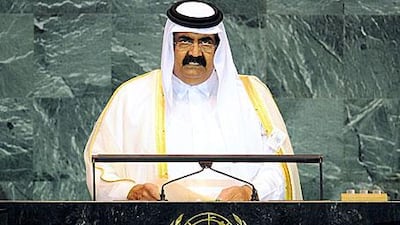NEW YORK // The recent UN General Assembly address by Sheikh Hamad bin Khalifa Al Thani, the emir of Qatar, served once again to demonstrate how the tiny Gulf emirate punches above its weight on the international scene. The ruler of a peninsula less than 12,000 sq km in size secured headline billing on an opening day that is now infamous for back-to-back speeches from the US president Barack Obama and the Libyan leader Muammer Qadafi.
Sheikh Hamad aroused neither the level of applause as Mr Obama, nor the yawns afforded to Mr Qadafi's 95-minute diatribe, as he reminded delegates of the lessons mankind has learnt since the UN was founded in 1945. Spinning a narrative from the "fires of World War II" to last year's financial crisis, the emir drew conclusions from the Cold War, the September 11 attacks on New York and Washington and fallouts from the war on terrorism.
"During the stages of global confrontation and polarisation, and the significant turmoil that followed - the international community lived in and suffered from severe confusion," he told the 192-nation chamber last month. "[It] became clear that achieving world peace and prosperity required more than the weapons of the mighty powers, more than bipolarity, more than the hegemony of one country, no matter how advanced that country might be, and a broader and more global management of urgent crises [was needed]."
Qatari involvement in peace efforts in Lebanon, Yemen and Sudan's troubled province of Darfur, can be viewed in the light of Sheikh Hamad's doctrine, in which small nations have a bigger say in world affairs. Governing a population of little more than 830,000, Sheikh Hamad has raised the international standing of Qatar since seizing power from his father Khalifa bin Hamad Al Thani, in a bloodless coup in 1995.
Savvy use of hydrocarbon reserves, including the world's third largest proven natural gas deposits, has granted Qatar the world's second highest per-capita income, second only to Liechtenstein, and led to growing international clout. Unlike its low-key neighbours in the six-nation Gulf Co-operation Council (GCC), Qatar routinely sticks its head above the diplomatic parapet and hosts high-stakes negotiations, seeking to tackle seemingly-intractable regional disputes.
Brokering a power-sharing deal between Hizbollah and the ruling coalition last year brought Lebanon back from the brink of civil war and bolstered Qatar's growing status against regional heavyweights, Egypt and Saudi Arabia. The emirate is mediating between the Sudanese government and Darfuri rebels, the Justice and Equality Movement, hoping to end a conflict that has claimed the lives of some 300,000 people since fighting erupted in 2003, according to UN figures.
The emirate mediated a peace deal between northern Yemen's al Houthi rebels and the government in 2007, but the truce broke down and escalated into full-scale battles in late July, bringing the number of displaced to 150,000 in five years of sectarian conflict. But Qatar's peace-dealing credentials have attracted criticism, notably last year, when Ethiopia severed diplomatic ties, saying botched attempts to negotiate a truce in war-ravaged Somalia had made the emirate a "source of instability in the Horn of Africa".
Maverick diplomacy has brought other controversies, with a policy of engaging all players - including Israel, Syria and Iran - sparking criticism. Last year, the emirate allowed a visit from Tzipi Livni during which Israel's foreign minister lobbied Arab leaders to forge ties with the Jewish state in a drive against Iran's nuclear programme. Qatar has likewise praised Hizbollah's military resistance against Israel during the 2006 conflict and supported Hamas, the Islamist rulers of Gaza - contravening the position of other US-backed Gulf governments, which support the Fatah-led Palestinian Authority.
The emirate orchestrates its diplomatic overdrive from the capital, Doha, having ended its two-year stint on the UN Security Council in 2007, but continues to wield influence at the world body's Manhattan headquarters. Qatar's UN ambassador, Nassir bin Abdulaziz al Nasser, regularly addresses committees and the 15-member Security Council, while chairing the high-level Committee on South-South Co-operation, which aims to boost trade and technology-sharing between developing countries.
Meanwhile, the emir's wife, Sheikha Mozah bint Nasser Al Missned, flies the flag for Qatar's humanitarian efforts, acting as a special envoy for education on behalf of the UN's cultural organisation, Unesco. Sheikha Mozah railed against the Israeli bombardment of Palestinian schools during its December-January Gaza onslaught, and last week spoke out against the 75 million children globally still denied access to education.
The first lady's speech in Paris mirrored Qatari positions on equitable global development and power-sharing, while addressing her trademark concern of the 150 million children, mostly girls, who will not be able to complete their primary education. "If we are really convinced that education is our way forward towards building a world - of democracy, liberty, equality and justice, it requires us first to rearrange our priorities, secondly to create a new culture based on a solid political will with the goal of reconciling heritage and progress, religious, social and political values, and, thirdly, working towards changing mentalities by making them in harmony with the requirements of society," said Sheikha Mozah.
jreinl@thenational.ae


